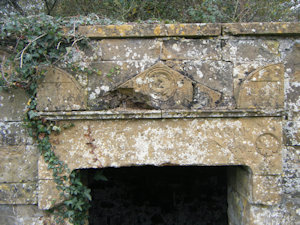 |
Dedication: none Location: Burton Dassett Coordinates: 52.160275N, -1.418986W Grid reference: SP398514 Heritage designation: Grade II listed building |
HOME - ENGLAND - WARWICKSHIRE
 |
Dedication: none Location: Burton Dassett Coordinates: 52.160275N, -1.418986W Grid reference: SP398514 Heritage designation: Grade II listed building |
The Holy Well at Burton Dassett, situated only metres away from Burton Dassett's ancient parish church, was certainly once used for baptisms. However, it is unclear whether any other traditions or legends were ever associated with the well, and little is recorded about its history.
The well was, evidently, of some significance, judging by the elaborate and large stone well-house that was at some point built around it. Its listing on the National Heritage List for England states that the well-house dates from 1840. However, in 1893, C.J. Ribton Turner in Shakespeare's Land, wrote this about the well:
|
Descending the southern spur of the hill we arrive at a well, situated in a stone chamber, inside which is the mutilated date 34, probably representing 1534. |
Turner was describing the well only fifty years after the National Heritage List for England states that it was built. Surely, if it had been built so recently, the carving would not be so "mutilated". It is interesting also that he assumes that the inscription once said "1534", as opposed to, say, "1834". The style, too, of the well-house is not dissimilar to that of Medieval well-houses. Could the well-house actually be much older than it is said to be?
The design of the well-house is rather unusual: a set of stone steps lead down into a large, shallow pool of water, which is around 2 metres square in size. R.C. Hope, in The Legendary Lore of the Holy Wells of England, also published in 1893, states that the well was once used for "the purposes of baptism and immersion". This provides a reason as to why the pool is so large; it was likely once much deeper. For what reason, then, would people have wished to immerse themselves in the water? At no point did the Church of England ever endorse the doctrine of "baptism by full immersion". Therefore, it seems more plausible that people once "immersed" themselves or bathed in the well's waters in the hope of getting healed. It would certainly explain the size of the pool.
Today, the well is easily accessible: it is situated right next to the church car park (which can be parked at free of charge). Although the amount of water in the well is low, it is certainly well cared for.
 |
 |
 |
 |
 |
 |
|
Access: The well located by the side of a quiet road. |
Copyright 2025 britishholywells.co.uk